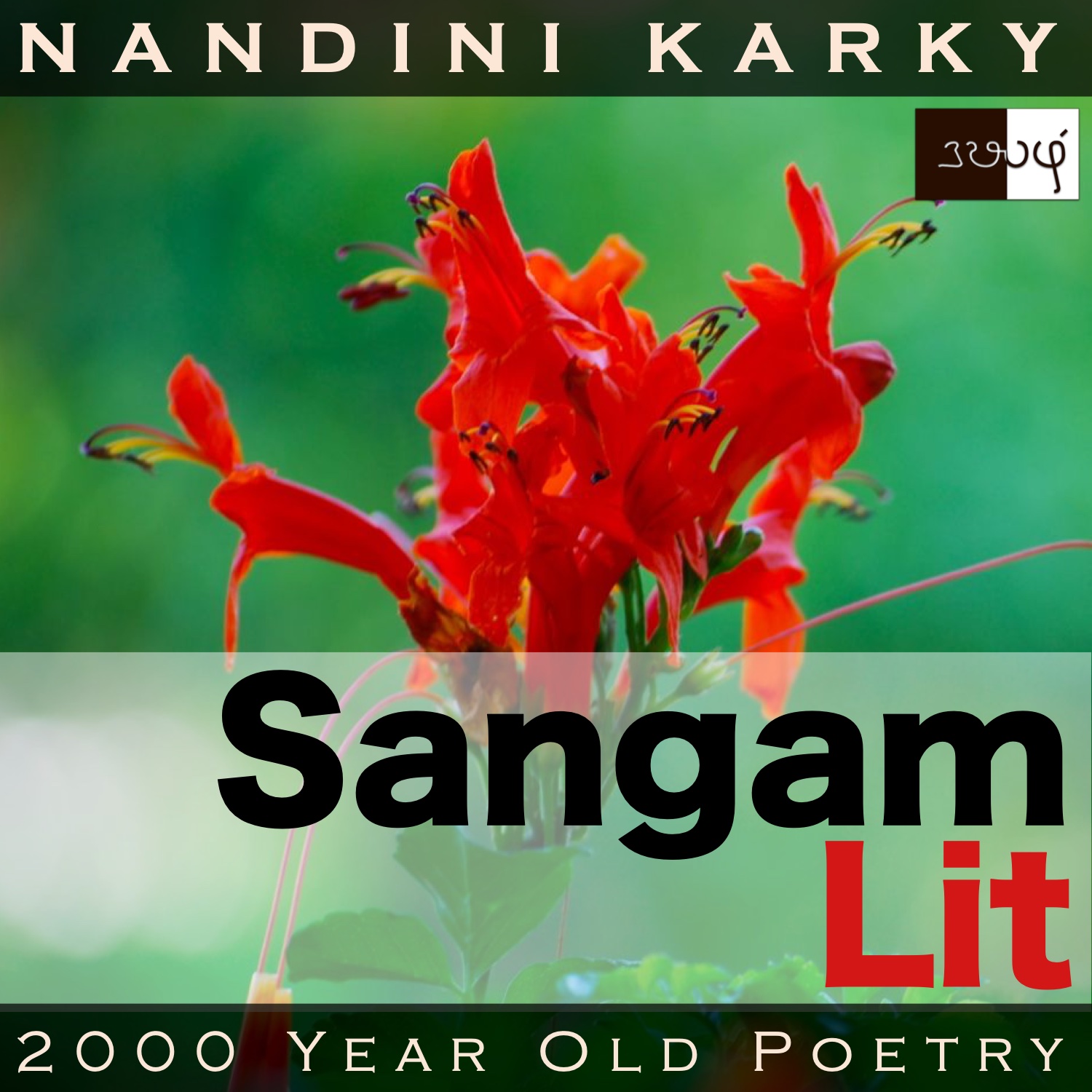Podcast: Play in new window | Download
Subscribe: Apple Podcasts | Spotify | Amazon Music | Android | iHeartRadio | TuneIn | RSS | More

I’m excited to explore the world of Kurunthogai along with you. Kurunthogai, in a nutshell, can be called ancient Tamil haikus, verses that power-pack love and nature in capsule-sized doses! In this episode, we are welcomed by the glowing red of Murugan’s mountain country, as portrayed in Sangam literary work, Kurunthogai 1, penned by Thippu Tholaar. Set in the hills of ‘Kurinji’, the verse speaks in the voice of the confidante to the man, refusing to accept his gift of flowers for the lady.
செங்களம் படக் கொன்று அவுணர்த் தேய்த்த
செங் கோல் அம்பின், செங் கோட்டு யானை,
கழல் தொடி, சேஎய் குன்றம்
குருதிப் பூவின் குலைக் காந்தட்டே.
Did you hear how the prefix ‘செங்’ meaning ‘red’ echoed again and again in the verse? It seems to splash the verse and the reader in that intense hue! The opening word ‘செங்களம்’ meaning ‘red field’ immediately brings to fore a battle-field, hemmed by streams of red. All dictionaries seem to point out the meaning of the word ‘அவுணர்’ as ‘demons’. Let’s delve into that in a little while! If this verse were an archaeological excavation, we would unearth three prominent artefacts of war – ‘செங் கோல் அம்பு’ or ‘red-tipped arrow’, ‘செங் கோட்டு யானை’ or ‘red tusk of an elephant’ and ‘கழல் தொடி’ meaning ‘a soldier’s armlets’. The final words of the verse ‘குருதிப் பூவின் குலைக் காந்தட்டே’ meaning ‘blood-hued flowers of the flame lily’ makes the taste of nature’s vivid beauty linger in our minds!
Unlike Natrinai verses with their dependable contexts, Kurunthogai’s contexts are not written in stone, as the original explanatory texts have been lost. However, this verse is believed to be said by the confidante to the man, when he approaches her, with a gift for the lady, hoping to win the confidante’s confidence. To the man, the confidante responds saying, “In the red-soaked war-fields, where demons were destroyed by his red-tipped arrows, the red god rides a red-tusked elephant, wearing a warrior’s valorous armlets. In his mountains, abound those blood-hued flower clusters of the flame-lily!” With these words, the confidante is refusing the man’s gift of flame-lilies, by saying that their home in the mountains is already filled with the same.
Something tells me you would like a deeper trek into this mountain forest! The confidante seems to be describing god Murugan and his abode. First, she talks about what the god does. He is waging war with the demons and succeeds in annihilating them. As can be expected from any war, no matter its lofty aims, bloodshed is an inevitable outcome, and so too, here the battle-field is soaked red, the arrows are glowing with scarlet tips, and the tusks of battle elephants are coated in crimson. This god is also said to be wearing a warrior’s armlets. So far, this character-sketch seems to be in the shade of a king in battle. However, the confidante mentions the name ‘Seyai’, which is said to be the ancient name of the god referred to as ‘Murugan’ in contemporary times. She concludes with the words to the man saying that the flower he has brought to win the lady grows in abundance in the mountains of this god. Trying to see a little more from these words, perhaps the lady has still not spoken about her relationship with the man and that’s why the confidante could be keeping him at arm’s length, refusing his gifts. Perhaps, this is a test to check the man’s perseverance in his pursuit of the lady.
The context reminded me of how in most of the animal kingdom, be it birds or mammals or insects, the male tries to woo the female with a display of its strength and beauty, while the female quietly judges the suitability. This man’s pursuit makes you conclude with a smile that humans are animals too. Only our approach seems to be a little more complicated! Meandering in the verse, I cannot help wondering if the notion of the god ‘Seyai’ mentioned here, arose out of tales of a leader, long lost in the mists of time, passed on from generation to generation, and embellished by human imagination. What if this ‘Seyai’ was one such king, who defeated his foes in the battlefield before history was born? In the imagination of the narrators, perhaps this founding king grew to be a god and his foes, diminished to be demons! No one can tell, for sure, indeed. However, there is one thing that we can do to feel that same awe in worshipping a god and that is to be with the beauty of these flame-lilies, shining radiantly in our mind’s eyes!




Share your thoughts...